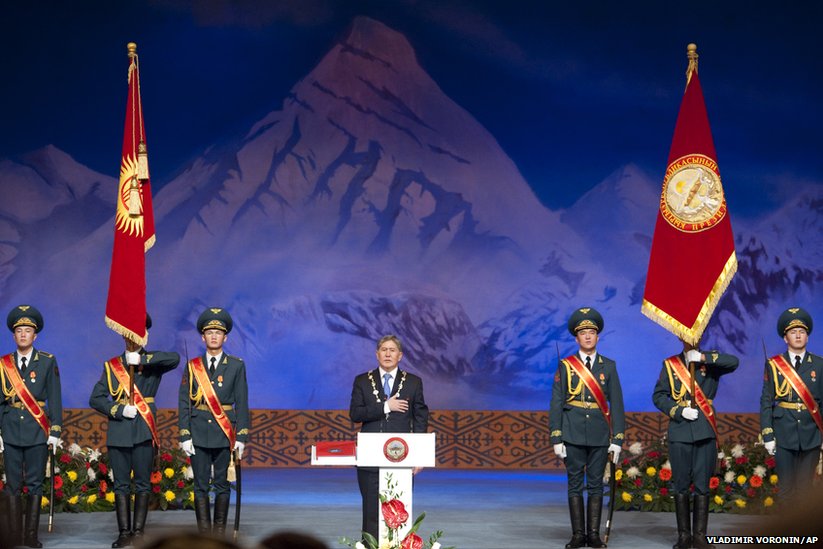
Kyrgyzstan Marks the First Peaceful Transfer of Power
Publication: Eurasia Daily Monitor Volume: 8 Issue: 219
By:

On December 1, the leader of Kyrgyzstan’s Social Democratic Party, Almazbek Atambayev, was inaugurated as President following a 63 percent victory in late October. This completes the plan set out in April-May 2010 by members of the interim government to create a precedent for a peaceful and lawful transfer of power in Kyrgyzstan, after years of corrupt and authoritarian rule. Atambayev was elected president in fairly free and transparent elections with his major competitors accepting his victory, despite their initial protest (www.akipress.kg, December 1).
Atambayev, however, faces grave challenges. At the very least, he must deal with three important issues: design a viable economic policy that would decrease Kyrgyzstan’s dependence on its neighbors, bridge the political north-south and inter-ethnic divides in the country, and reform the law-enforcement structures – often guilty of being a source of violence rather than a solution. In his election campaign Atambayev triggered discussion of these issues, emphasizing the importance of uniting the country.
Yet, now that Atambayev has secured victory, his ability or will to deal with these challenges remain less certain. His opponents in parliament fear that the new president might seek to increase the power of his party and focus on centralizing political power in his own hands. According to the new constitution adopted in July 2010, Kyrgyzstan is a parliamentary state and the president is elected for six years for a maximum of two terms.
The current system of parliamentary governance represents rather a political consensus between competing political actors than a vision. Former members of the interim government wanted to avoid any repetition of a scenario where power is concentrated in the hands of one political clique. Instead, political leaders who came to power after the ouster of former President Kurmanbek Bakiyev in April 2010, sought to create a system in which all political parties would have equal chances for competition. This initiative was tested during the parliamentary elections in October 2010, when opposition and newly emerged parties gained more seats than the country’s oldest Ata-Meken party led by Omurbek Atambayev.
Kyrgyzstan’s political actors have adapted to this environment, where most decisions are made by the parliament. Corruption and nepotism are still widespread, but decentralized compared to what was common during the presidency of Bakiyev or his predecessor Askar Akayev. Members of Parliament (MPs) are learning to adjust to the new level of transparency in their work, at times preferring to bully journalists. Some government institutions are struggling to develop and follow new bureaucratic procedures that would make their work more predictable. Other state institutions, however, such as the interior ministry and the judiciary, are unable to adapt to the new environment and have resorted to more oppressive and corrupt practices. Police officials target ethnic Uzbeks in southern Kyrgyzstan, while in Bishkek they try to silence those who criticize them.
The elections have received regional recognition: Georgian President Mikheil Saakashvilli and his Turkish counterpart, Abdullah Gul, attended the inauguration ceremony. High-ranking officials from other countries also attended, including Kazakhstan’s Prime Minister Karim Masimov and Tajikistan’s government head Akil Akilov (www.24.kg, November 30). Officials from Belarus, Turkmenistan, China, Mongolia, and Russia were also present. However, the head of the Russian presidential administration, Sergey Naryshkin, canceled his visit to Kyrgyzstan, possibly due to Saakashvili’s presence.
Meanwhile, the outgoing President Roza Otunbayeva has received widespread international and domestic recognition for being willing to give up her office after 18 months. During her short tenure as president, she has met with more heads of state and government than some of her Central Asian counterparts during decades in power. The day after the elections last month Bishkek residents greeted her with an endorsement, “Thank you, Roza” consisting of roses. According to Otunbayeva’s press office, the former president plans to remain in Kyrgyzstan and work on non-political issues related to education.
As she left her post, Otunbayeva apologized for being unable to prevent the ethnic clashes in Osh in June 2010 that cost the lives of 470 people, mostly ethnic Uzbeks (www.rferl.org, November 30). She is also widely criticized for not being able to free the prominent human rights activist, Azimjon Askarov, who has come to symbolize targeted persecution of ethnic Uzbeks by law-enforcement forces.
Atambayev lacks the charisma and international experience enjoyed by his predecessor. He has also clearly set out a foreign policy agenda that prioritizes the country’s ties with Russia, unlike Otunbayeva’s more balanced approach. For now, however, Atambayev is the most moderate politician in Kyrgyzstan who sought to gain the support of all ethnic groups across the country. His future legacy will likely be measured by how much he distances Kyrgyzstan from its history of authoritarianism and instability.




